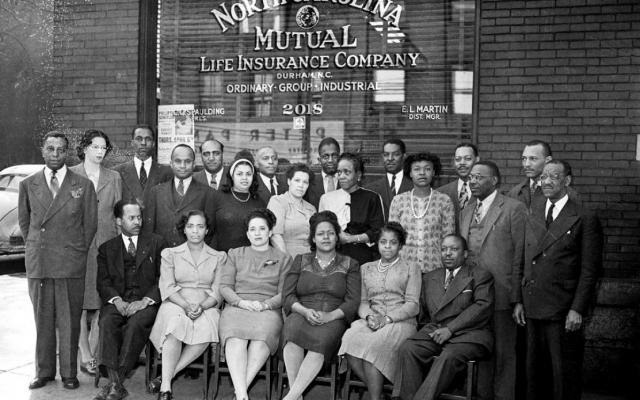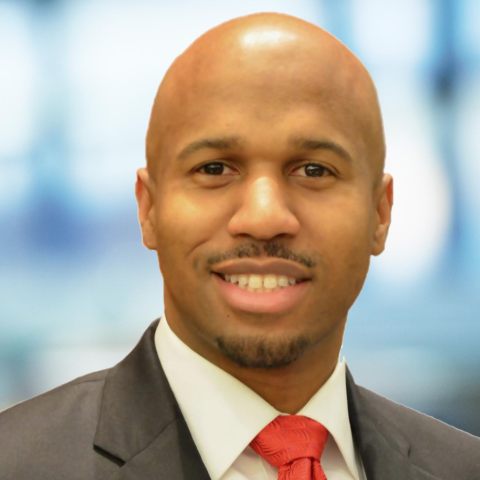Join the conversation as we bring together scholars and academics from institutions around the country to share out their research in a discussion-based forum.
By studying the history of Black entrepreneurship and innovation, we can gain an understanding of the creative strategies these entrepreneurs employed to succeed. We will discuss how the constraints they faced have limited overall economics of not only Black communities but our society as a whole. We will explore how so many of these constraints, which have become institutionalized, can be overcome in the future.
Free and open to the public.
Past Events
April 2025
History and Legacy of Black Entrepreneurship Spring Roundtable
Jill D. Snider and Heather Butina-Sutton
Join us for a roundtable discussion as we gather our spring cohort of speakers.
Exploring Entrepreneurship as Resistance Among Black Women Street Vendors in Antebellum Charleston
Heather Butina-Sutton
Join Heather Butina-Sutton as she uncovers how market spaces became unexpected sites of resilience and empowerment in Antebellum Charleston.
February 2025
The Angels are in the Details
Jill D. Snider
Reconstructing an African American inventor’s life from circumstantial evidence. This talk is part of the History and Legacy of Black Entrepreneurship in the United States speaker series.
November 2024
History and Legacy of Black Entrepreneurship Fall Roundtable - cancelled
Join us as we gather all of our Fall speakers from our History and Legacy of Black Entrepreneurship in the United States series.
Archiving Black Entrepreneurship - cancelled
This presentation explores the work of preserving Black entrepreneurial histories. It does so through revisiting a volunteer archive project.
April 2024
History and Legacy of Black Entrepreneurship Spring Roundtable
Join us as we gather our Spring speakers from our History and Legacy of Black Entrepreneurship in the United States talks. This online roundtable will focus on the research these scholars have done to uncover some of our country's most impactful yet forgotten entrepreneurs.
Mapping Entrepreneurial Women of Color: From Pastry Chefs to Washerwomen in 1855 Charleston, South Carolina
Alisha Marie Topete Cromwell, Albany State University
This talk with Alisha Marie Topete Cromwell is part of the History and Legacy of Black Entrepreneurship in the United States speaker series.
February 2024
Harriet Jones, Black Womanhood, and Black Entrepreneurship
Betsy Schlabach, Lawrence University
Join the kickoff to this semester's History and Legacy of Black Entrepreneurship series with Dr. Betsy Schlabach.
December 2023
History and Legacy of Black Entrepreneurship Fall Roundtable
Clarissa Myrick Harris, Crystal M. Moten, and Dan Wadhwani
Join us as we gather the Fall speakers from our History and Legacy of Black Entrepreneurship in the United States series. This online roundtable will focus on the research these scholars have done to uncover some of our country's most impactful, yet forgotten entrepreneurs.
The Civil Rights Movement and the Rebirth of Entrepreneurship
R. Daniel Wadhwani, University of Southern California
Join this session of the History and Legacy of Black Entrepreneurship in the United States with Dr. Dan Wadhwani.
November 2023
Making Change: Black Business Public HERstory
Crystal M. Moten
This talk will explore the history and possibilities of the entrepreneurial contributions of Black women.
Power to the People
Clarissa Myrick-Harris, Morehouse College
A discussion focused on the role of the Black press in Atlanta, Georgia during the civil rights movement and the impact they have on the community today.
May 2023
History and Legacy of Black Entrepreneurship in the United States Roundtable
Nicholas Gaffney, John Humphreys, Milorad Novicevic, LaTanya White
Join us as we gather our spring speakers from our History and Legacy of Black Entrepreneurship in the United States talks. This online roundtable will focus on the research these scholars have done to uncover some of our country's most impactful yet forgotten entrepreneurs.
April 2023
Exploring Historic Black Social Innovators & Organizational Theory
Milorad Novicevic, University of Mississippi and John Humphreys, Texas A&M University
Drs. John Humphreys and Milorad Novicevic will discuss the lived experiences of historic Black social innovators and the theory surrounding them. This talk is part of our ongoing speaker series on the History and Legacy of Black Entrepreneurship in the United States.
Dizzy Gillespie for President!
Nicholas Gaffney, University of South Carolina Upstate
Nicholas L. Gaffney will discuss Birks “Dizzy” Gillespie’s campaign for the presidency of the United States in the 1964 general election and Gillespie's contribution to the civil rights movement. This talk is part of our ongoing speaker series The History and Legacy of Black Entrepreneurship in the United States.
February 2023
Building Black Dynasties: Genealogy, Succession Planning and Wealth Transfer in Black Business Families
LaTanya White, Concept Creative Group
Dr. LaTanya White will present the first workshop in the History and Legacy of Black Entrepreneurship in the United States series for the spring 2023 semester.
History and Legacy of Black Entrepreneurship in the United States Roundtable
Allison Blakely, Boston University and Brandon K. Winford, University of Tennessee, Knoxville
Join us as we gather our fall 2022 cohort of History and Legacy of Black Entrepreneurship in the United States speakers for a roundtable.
November 2022
Dreaming of Colored People: Black Women and Finance in the Jazz Age
Shennette Garrett-Scott, Texas A&M University
Black Business Activism in the Mid-Twentieth Century South
Brandon K. Winford, University of Tennessee, Knoxville
Join Dr. Brandon Winford as he discusses the activism of banker-lawyer John Hervey Wheeler during the modern civil rights movement. This is the second lecture in the History and Legacy of Black Entrepreneurship in the United States series for the fall 2022 semester.
More Than Just a Notion: Audacious Ambitions vs Challenges Faced by 19th-Century African-American Entrepreneurs
Allison Blakely, Boston University
Allison Blakely will present the first workshop in the History and Legacy of Black Entrepreneurship in the United States series for the fall 2022 semester. He will discuss the contributions of three innovative Black entrepreneurs who have been erased from US history.
November 2021
History and Legacy of Black Entrepreneurship in the United States Fall Roundtable
Simone T. A. Phipps, Middle Georgia State University and Keith Hollingsworth, Morehouse College and Leon Prieto, Clayton State University
Join us as we gather our fall cohort of History and Legacy of Black Entrepreneurship in the United States speakers for a roundtable.
Decolonizing the Business Curriculum: Insights from Africana History & Philosophy
Leon C. Prieto, Clayton State University
Join us in welcoming Dr. Leon C. Prieto from Clayton State University. His lecture is part of our initiative to examine the history and legacy of Black entrepreneurship in the United States.
October 2021
Working Twice as Hard to get Half as Far: Earning Legitimacy as a Black Business in History
Keith Hollingsworth, Morehouse College
Join us in welcoming Dr. Keith Hollingsworth from Morehouse College. His lecture is part of our initiative to examine the history and legacy of Black entrepreneurship in the United States.
The Ties that Bind: Black Feminism, Intersectionality, and Black Women in Entrepreneurship History
Simone T. A. Phipps, Middle Georgia State University
Join us in welcoming Dr. Simone T. A. Phipps from Middle Georgia State University. Her lecture is part of our initiative to examine the history and legacy of Black entrepreneurship in the United States.
April 2021

History and Legacy of Black Entrepreneurship in the United States Spring Roundtable
Juliet Walker and John S. Butler, University of Texas at Austin and Martin Ruef, Duke University and Christine Kinealy, Quinnipiac University
Join us as we gather our spring cohort of History and Legacy of Black Entrepreneurship in the United States speakers for a roundtable.
Standing on Shoulders: The Contribution of Black Entrepreneurship to the Continuous Rebirth of the Black Bourgeoisie, Data Through Time and Space
John S. Butler, University of Texas at Austin
Join us in welcoming Dr. John S. Butler from the University of Texas at Austin. His lecture is part of our initiative to examine the history and legacy of Black entrepreneurship in the United States.
March 2021
Exoduster Entrepreneurs: Creating Black Business Communities in the West
Martin Ruef, Duke University and Ihsan Beezer, Rutgers University
Join us in welcoming Dr. Martin Ruef from Duke University and Ihsan Beezer from Rutgers University for a talk on Black businesses in the west. Their lecture is part of our initiative to examine the history and legacy of Black entrepreneurship in the United States.
African American Business, Entrepreneurship and Capitalism, 1619-2021: Where Do We Go From Here?
Juliet E. K. Walker, University of Texas at Austin
Join us in welcoming Dr. Juliet E. K. Walker from the University of Texas at Austin. Her lecture is part of our initiative to examine the history and legacy of Black entrepreneurship in the United States.
Owning Their Stories: How Black Abolitionists Survived– and Thrived– in Ireland
Christine Kinealy, Quinnipiac University
Join the us in welcoming Dr. Christine Kinealy from Quinnipiac University for a talk on Black abolitionists in Ireland. Her lecture is part of our initiative to examine the history and legacy of Black entrepreneurship in the United States.


